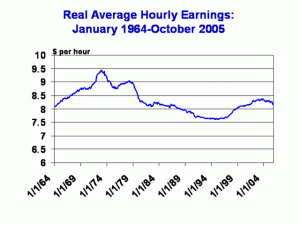This piece is intended to answer some of people’s questions about how inflation affects what they are being paid.
First of all, what is inflation? Inflation means that money is worth less and less over time.
Example: You live in a country that has inflation (as most countries do, for good reasons which we will not discuss here). If you have $100 dollars right now, you have an incentive to spend it now. If you wait for a year (or a few years), that same $100 will not be able to buy quite as much as it could when you first got it.
The value of a dollar goes down slowly over time.
Inflation and wages
What does this mean for wages? Well, if you are not getting raises that are equal (or higher than) inflation, then you are actually earning LESS each consecutive year.
Examples: Both of these theoretical people live in the same country. Let us assume that this country has a 2% inflation rate per year. (This is a good assumption since most countries aim for an inflation rate around this value.)
Alfred manages to negotiate a raise of 1.5% for this year. Since he doesn’t know what inflation is, he doesn’t realize that at the end of the year, he is actually being paid less value than he was at the beginning of the year. This is because his wage raise of 1.5% is lower than the inflation value of 2%.
Tina understands inflation, and has used this understanding in her negotiations with her employer. She has thus negotiated a wage increase of 3% for this year. She knows that her real wage increase is 1% because 3% – 2% = 1%.
Every wage earner should know this. It is crucial for understanding how much you are really being paid.
Real Wage
We used the concept ‘real wage’ above. A real wage takes into account the effects of inflation.

Example: Joe the boot maker earned $30,000 last year. He managed to get a raise of 2%, so this year he is making $30,000 times 1.02 = $30,600. It looks like he is earning more than last year, but since inflation is 2%, he is actually earning the same amount of value. His real wage has not changed because his raise and inflation are the same amount. He has the same amount of buying power that he had last year.
Wage Stagnation
This is what can happen when inflation rises about as fast as wages do. While people are earning more dollars, they are not earning more purchasing power.
This is really important to understand in the United States. The US has experienced over 40 years of real wage stagnation.
This means that in the last couple decades, the real wage paid for an average hour of work in the US has not increased.
This effect is related to the accumulation of wealth in the hands of the richest few people in the US. The extremely rich people in the US have had their share of the national wealth and income rise dramatically in the last couple decades. These benefits have not been shared equally.
These facts help us understand why it is important for us to begin addressing the growing inequality in American society.
For more information on economics concepts, take a look at our post about Key terms and definitions in economics.

2 thoughts to “Wage reduction through inflation”